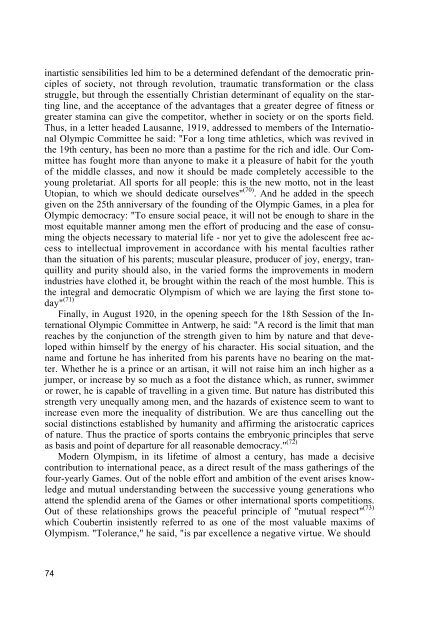Create successful ePaper yourself
Turn your PDF publications into a flip-book with our unique Google optimized e-Paper software.
inartistic sensibilities led him to be a determined defendant of the democratic principles<br />
of society, not through revolution, traumatic transformation or the class<br />
struggle, but through the essentially Christian determinant of equality on the starting<br />
line, and the acceptance of the advantages that a greater degree of fitness or<br />
greater stamina can give the competitor, whether in society or on the sports field.<br />
Thus, in a letter headed Lausanne, 1919, addressed to members of the International<br />
Olympic Committee he said: "For a long time athletics, which was revived in<br />
the 19th century, has been no more than a pastime for the rich and idle. Our Committee<br />
has fought more than anyone to make it a pleasure of habit for the youth<br />
of the middle classes, and now it should be made completely accessible to the<br />
young proletariat. All sports for all people: this is the new motto, not in the least<br />
Utopian, to which we should dedicate ourselves" (70) . And he added in the speech<br />
given on the 25th anniversary of the founding of the Olympic Games, in a plea for<br />
Olympic democracy: "To ensure social peace, it will not be enough to share in the<br />
most equitable manner among men the effort of producing and the ease of consuming<br />
the objects necessary to material life - nor yet to give the adolescent free access<br />
to intellectual improvement in accordance with his mental faculties rather<br />
than the situation of his parents; muscular pleasure, producer of joy, energy, tranquillity<br />
and purity should also, in the varied forms the improvements in modern<br />
industries have clothed it, be brought within the reach of the most humble. This is<br />
the integral and democratic Olympism of which we are laying the first stone today"<br />
(71)<br />
Finally, in August 1920, in the opening speech for the 18th Session of the International<br />
Olympic Committee in Antwerp, he said: "A record is the limit that man<br />
reaches by the conjunction of the strength given to him by nature and that developed<br />
within himself by the energy of his character. His social situation, and the<br />
name and fortune he has inherited from his parents have no bearing on the matter.<br />
Whether he is a prince or an artisan, it will not raise him an inch higher as a<br />
jumper, or increase by so much as a foot the distance which, as runner, swimmer<br />
or rower, he is capable of travelling in a given time. But nature has distributed this<br />
strength very unequally among men, and the hazards of existence seem to want to<br />
increase even more the inequality of distribution. We are thus cancelling out the<br />
social distinctions established by humanity and affirming the aristocratic caprices<br />
of nature. Thus the practice of sports contains the embryonic principles that serve<br />
as basis and point of departure for all reasonable democracy." (72)<br />
Modern Olympism, in its lifetime of almost a century, has made a decisive<br />
contribution to international peace, as a direct result of the mass gatherings of the<br />
four-yearly Games. Out of the noble effort and ambition of the event arises knowledge<br />
and mutual understanding between the successive young generations who<br />
attend the splendid arena of the Games or other international sports competitions.<br />
Out of these relationships grows the peaceful principle of "mutual respect" (73)<br />
which Coubertin insistently referred to as one of the most valuable maxims of<br />
Olympism. "Tolerance," he said, "is par excellence a negative virtue. We should<br />
74

















